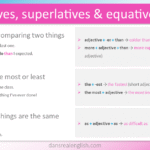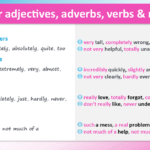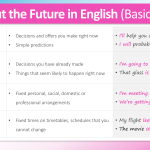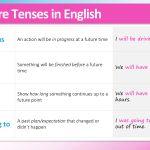How to use Present Perfect Simple Tense
The Present Perfect Simple Tense is one of the most common grammar topics in both formal and informal English.
Many students hate this tense, but understanding how present perfect simple works WILL make you sound more natural in English!
This free English lesson is designed to help you feel more confident about using Present Perfect Simple in everyday situations.
When should we use Present Perfect Simple?
Present perfect simple is very common in these situations:
- past actions which are important now
- recent experiences or achievements
- life experiences
- changes or progress
- unfinished time periods
- present results
For talking about PAST actions relating to NOW!
In general, we use present perfect simple tense when we want to talk about completed (past) actions which relate to the present (now).

In this way, present perfect simple sentences tell us about the past and the present.
For example, if I say:
I’ve had my lunch.
I’m actually saying 2 things:
- “I ate my lunch” (in the past)
AND:
- “I am not hungry, now” (right now)
Present Perfect for recent actions or experiences
We use the present perfect simple tense to talk about recent actions or achievements. These actions usually happened not long ago, and they still feel relevant.
Example
I’ve just watched the new episode.
- The action happened recently
- “Just” shows the timing
- We don’t say exactly when
- Structure: have/has + past participle
Other examples
- He’s already finished his homework.
- Have you tried the new café?
- They haven’t called me yet.
Mini dialogue
- Leah: Have you seen the new documentary?
- Sam: Yeah, . I watched it last night, actually.
- Leah: I haven’t watched it yet. Was it good?
- Sam: Yeah, it’s great. In fact, I’ve just told my brother to watch it!
Present Perfect for life experiences
We use the present perfect simple to describe life experiences — things that may have happened at any time in a person’s life.
This use often includes ever (in questions) and never (in statements).
Example
Have you ever visited another country?
- The question is about experience, not a time
- “Ever” is used in questions
- Answer examples: Yes, I have. / No, I haven’t.
Other examples
- I’ve never eaten sushi.
- She’s flown in a helicopter once.
- They’ve been to several festivals.
Mini dialogue
- Jake: Have you ever been camping?
- Lina: I have. I went last summer with my cousins.
- Jake: I haven’t done it before. Was it fun?
- Lina: Yeah — except when it rained all night!
Present Perfect for changes and progress
We use the present perfect simple tense to describe how things have changed or developed over time. This often includes expressions like since, in the last few months, or over the years.
Example
He’s become more confident since he started his new job.
- The change began in the past and is still true now
- SINCE shows the starting point
- The focus is on the current result of a past change
Other examples
- Prices have gone up in the past year.
- I’ve lost some weight since January.
- Have things improved since last week?
Mini dialogue
- Leo: Has your English improved since you started lessons?
- Emi: Definitely. I’ve learned so many useful expressions.
- Leo: I’ve noticed your speaking is much smoother now.
- Emi: Thanks! I’ve also watched more English shows lately.
Present Perfect for unfinished time periods
We use the present perfect simple tense to describe things that have happened in a time period that is still happening. These might be today, this week, or this year.
Example
I’ve sent three emails this morning.
- “This morning” is still continuing
- The speaker talks about what has happened so far
- Different from past simple (I sent three emails yesterday)
Other examples
- She’s been to the gym twice this week.
- I haven’t eaten anything today.
- Have you done anything fun this month?
Mini dialogue
- Ali: Have you done anything fun this week?
- Jana: Not really. I’ve mostly worked.
- Ali: Same. I haven’t even seen my friends today.
- Jana: I’ve watched a few videos, but that’s it.
For present results
We use the present perfect simple when a past action has a clear result or effect now. The action is complete, but it matters in the present.
Example
I’ve lost my keys.
- The action happened before now
- The result is still true: the keys are still missing
- We often use “just” if the action happened very recently: e.g. I’ve just lost my keys!
Other examples
- She’s cut her finger.
- I’ve broken my glasses.
- He’s missed the bus.
Mini dialogue
- Nina: Are you okay? You look upset.
- Tom: I’ve lost my phone.
- Nina: Really? When did that happen?
- Tom: I don’t know. I’ve checked my bag three times already.
Present Perfect Simple in spoken English
Diary entry
It’s been a busy week. I’ve already finished two essays and I’ve done most of my reading. I haven’t gone out much, but I’ve spoken to a few friends online. Over the past few months, I’ve enjoyed studying from home. I’ve learned how to manage my time better and I’ve become more focused. I’ve also tried cooking more – I’ve made three new recipes this month. One was great, the other two… not so much. I’ve never used so many spices in one dish! Still, it’s been fun. I haven’t been to the gym this week, but I’m planning to go tomorrow. Overall, I’ve made good progress.
Since vs. for with present perfect
We use since to say when something started, and for to say how long it has lasted.
- I’ve lived here since 2018. (starting point)
- I’ve lived here for five years. (duration / amount of time which has passed till now)
Since + specific time: 2010, Monday, last week, yesterday
For + time period: two days, five years, a long time
Been vs. gone in present perfect sentences
“Been” and “gone” are both past participles used with the present perfect simple (have/has + past participle). But they are not the same in meaning.
Understanding the difference is important when you want to talk about experiences, recent actions, or someone’s location.
When to use “have been“
We use have been in the present perfect to show someone visited a place and came back. It means the trip is finished.
- I’ve been to Spain. (I went there, and now I’m back.)
- She’s been to the new restaurant. (She visited it, and she’s not there now.)
- We’ve been to the gym today. (We’re not at the gym anymore.)
But..
If you are talking about a place where you are right now, “have been” means you are still there:
- I’ve been at this bus stop for 2 hours! (I’m still at the bus stop).
- I’ve been here for ages. (I came here a long time ago, and I am still here).
When to use “have gone“
We use have gone to show someone has left and is still away. They haven’t come back yet!
- He’s gone to the supermarket. (He’s still there or on the way.)
- They’ve gone on holiday. (They’re still on holiday.)
- Mum’s gone out. (She’s not home yet.)
“Have been” vs “have gone”: examples
| Sentence | Meaning |
|---|---|
| She’s been to Paris. | She went there, and then she came back. |
| She’s gone to Paris. | She’s still there, or she hasn’t come back yet. |
Present perfect simple vs past simple
We use the present perfect simple to describe actions that have a connection to the present.
We use the past simple for actions that happened at a specific time in the past (e.g. at 8am), especially when the time is finished.
Present perfect:
I’ve seen that film before. (No time given – it still matters now)
Past simple:
I saw that film last week. (Specific time – the action is finished)
We tend to use these words and phrases with present perfect:
ever, never, just, already, yet, today, this week
And we use these words and phrases with the past simple:
yesterday, last week, in 2010, two days ago
Examples:
| Past action | Present connection |
|---|---|
| I saw the movie | |
| (last week) | (past simple – finished) |
| I’ve seen the movie | |
| (no time given) | (present perfect – still matters now) |
Avoid these common present perfect simple mistakes!
Getting the hang of present perfect simple can be tricky.
Here are some typical present perfect simple mistakes that learners often make.
I have saw that person before.
Why it’s wrong: “Saw” is the past simple, not the past participle.
Correct: I have seen that person before.
She didn’t has an exam today.
Why it’s wrong: We need present perfect simple (not past simple) because today is still continuing. We use “HAVE” to make perfect forms, not “DID”. This sentence is neither present perfect simple nor past simple – it’s just wrong!
Correct: She hasn’t had an exam today.
Have you ever went to Paris?
Why it’s wrong: “Went” is the past simple; we need the past participle.
Correct: Have you ever been to Paris?
I’ve seen my dad yesterday.
Why it’s wrong: “Yesterday” is a finished time, and we are telling a story. We need past simple, here, NOT present perfect simple.
Correct: I saw my dad yesterday.
I’ve worked at this company since three years.
Why it’s wrong: We use for with a length of time (e.g., two years), not since, which needs a starting point (e.g., 2023).
Correct: I’ve worked at this company for three years. OR I’ve worked at this company since last 2023.
He’s gone to London last week.
Why it’s wrong: “Gone” is used for a trip still in progress; “last week” is finished time.
Correct: He went to London last week. (Past simple) OR He’s been to London several times. (Present perfect simple)
Practice activities
Exercise 1: Find the Mistake
1. She didn’t has lunch today.
2. I have saw that movie before.
3. Have you ever went to Paris?
4. He’s gone to New York last week.
5. I’ve lived here since two years.
6. I’ve finished my work yesterday.
Exercise 2: Complete the Missing Word
1. I’ve just the new episode.
2. She’s her finger.
3. They haven’t called me .
4. Have you ever sushi?
5. We’ve to three concerts this month.
6. He’s more confident since starting the new job.
Exercise 3: Choose the Correct Transformation
1. I lost my keys this morning.
2. She visited Italy in the past.
3. Did you try the new café?
4. I wrote two essays today.
5. He started playing guitar last year.
6. We didn’t go out this week.
Your final score
Total: 0 / 0







